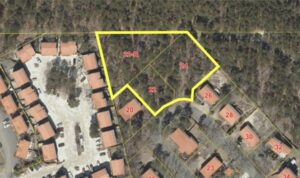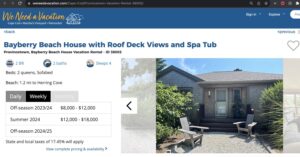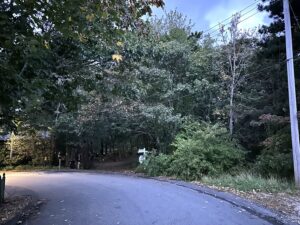PROVINCETOWN — There will be 14 articles in the town meeting booklet on Monday, Oct. 23, but only a few of them are likely to provoke much discussion at town hall that evening.
A $2-million land purchase on Nelson Avenue is the reason the meeting was called, as the expenditure must be authorized by town meeting voters for the purchase to proceed.

Alongside it on the warrant are two short-term rental regulations, a ban on “fractional ownership” of homes, a liberalization of accessory dwelling unit rules, and three articles that help move forward plans for housing on town-owned land at 3 Jerome Smith Road, 26 Shank Painter Road, and 288A Bradford St.
The land purchase was announced on July 24, when the select board approved a negotiated price of $2.035 million for three adjacent parcels: 22 Nelson, 22R Nelson, and 24 Nelson. Together, the parcels amount to nine-tenths of an acre.
Developer Tom Tannariello had gone through 13 months of meetings to secure permits for 12 residential condominium units at 22 and 22R Nelson Ave. under the town’s inclusionary bylaw. Ten of the units would have been sold at market rate, while two would have been affordable-ownership units.
The planning board approved that project in January, but Tannariello put the properties on the market in April anyway.
With 24 Nelson Ave. included, the properties could currently support 18 units, according to Town Manager Alex Morse. But once the town’s sewer system is expanded to include Nelson Avenue, the switch from density rules based on septic systems to those for sewered areas would allow for 48 to 60 units, Morse said.
“Securing the land is undoubtedly in the Town’s best interest,” reads the official explanation for Article 8 on the warrant. “Without the Town’s intervention, the likelihood of private development looms large, leading to a proliferation of market-rate condominiums, many of which could potentially become short-term rentals.”
When Tannariello’s project was before the planning board, critics argued that the 10 market-rate condos would likely become short-term rentals, and that two affordable units were not sufficient to make the project worthwhile.
Morse argued, however, that the town’s density formulas clearly permitted the project and that failing to approve it would be a sign that the planning board could not actually implement the inclusionary bylaw it had sought.
With Tannariello’s change in plans, however, if the town now buys the land, all the units that are built there will likely be deed-restricted in one way or another, either as affordable rentals or affordable ownership units, perhaps with a new kind of restriction copied from Vail, Colo. that town meeting voters endorsed this spring.
Short-Term Rental Rules
Articles 11 and 12 would create a bylaw to regulate short-term rentals in two specific ways: by preventing corporate ownership of short-term rental properties and by limiting short-term rental certificates to two per person.

Under Article 11, trusts, S corporations, and LLCs could still hold short-term rental certificates, but they would have to have all their human owners named on documents at town hall.
Article 12 would limit each person to holding only two short-term rental certificates. Both articles would “grandfather in” existing short-term rentals, even if they are currently corporate-owned or are held by someone with more than two.
In spring 2022, the Independent examined the state Dept. of Revenue’s list of properties in Provincetown that had paid short-term rental taxes at any time between July 2019, when the tax went into effect, and February 2022.
Eighty percent of the properties on the list were held by people who had only one short-term rental; 128 properties were held by people who had two properties on the short-term rental list.
There were 13 owners at that time who had three properties on the list, five owners who had four, two owners who had five, and one who had six. That means 75 short-term rental properties at that time would have been affected if Article 12 had been in place then.
Some of those properties have been sold since then — for instance, the owner of five short-term rental properties above Way Downtown and Tin Pan Alley, across from town hall, sold all her holdings to two different buyers this year.
Other buyers have made bulk purchases of property, however.
In January, a company called Puck’s Folly LLC sold a half-acre parking lot in Cambridge for $9.4 million. It subsequently bought a $2.9-million house on Martha’s Vineyard and three Provincetown properties in March and April.
The historic Martin House at 157 Commercial St. was purchased for $2.8 million on March 9, a two-bedroom house at 101 Bayberry Ave. was purchased for $1.9 million on April 3, and a one-bedroom condo, 6 Mechanic St. Unit B, was purchased for $665,000 on April 11. All four properties are now short-term rentals.
The two-bedroom at 101 Bayberry rents for $12,000 to $18,000 a week on weneedavacation.com, and the five-bedroom Martin House, formerly a restaurant and then a single-family home, rents for $15,800 to $21,000 a week in summer on its own website.
These are the kind of bulk corporate purchases that select board members have said are not yet common here but that they would like to prevent. “It would be nice to be ahead of the curve for once,” select board chair Dave Abramson said at a housing workshop in June.
Fractional Ownership and ADUs
Article 13, a ban on fractional ownership of properties, is another trend that the town would like to get ahead of. Select board member Leslie Sandberg brought up the subject in the spring, saying that housing advocates on Martha’s Vineyard have been alarmed to see fractional ownership deals beginning to appear in the market there.

Sandberg recused herself from voting on Article 13 when the select board made its final endorsements on Oct 10, however. “I voted to recuse myself because of a client that I have, and I’m not sure where they stand on fractional ownership,” Sandberg said. “I do not want to appear to tip the scales either way.”
Sandberg, who is a partner in and owner of the communications firm Rose, Sandberg, and Associates, told the Independent that the client in question is the Cape Cod and Islands Association of Realtors.
Article 14 would remove existing year-round restrictions on the use of new accessory dwelling units and add two looser ones: a ban on short-term rentals in ADUs and a prohibition on splitting ADUs off into condominiums. The town has produced only one new ADU under its current bylaw, and participants in the housing workshop argued that looser rules might encourage more.
Abramson voted against Article 14 on Oct. 10, while the rest of the board endorsed it.
Town meeting will start at 6 p.m. on Monday, Oct. 23 at town hall. Voters who have missed the last several elections may have been marked “inactive” in the town’s voter rolls and should bring identification with them for voter check-in.



